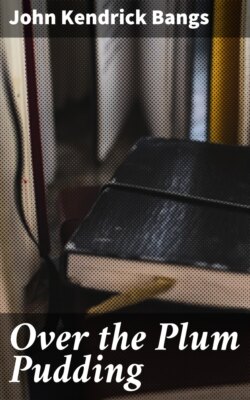Читать книгу Over the Plum Pudding - John Kendrick Bangs - Страница 8
На сайте Литреса книга снята с продажи.
II
ОглавлениеTable of Contents
To begin, I will place the responsibility for the whole affair where it belongs. It was the fault of no less a person than Mr. Rudyard Kipling. Mr. Andrew Lang's connection with the episode, of course, involved us in the final catastrophe, but he is not to blame. Mr. Kipling started the whole affair, and if Mulvaney and Ortheris and Learoyd had behaved themselves properly the book would now be resting calmly upon many an appreciative library shelf, instead of being, as it is, but a sorrowful memory and a possible cause for a series of international lawsuits.
This fact being understood as the basis of my argument, I will proceed to prove it; and to do so properly I must give in brief outline some idea of the contents of the book. It was to be called "Over the Plum-Pudding; or, Tales Told Under the Mistletoe, by Sundry Tattlers. Edited by Horace Wilkinson"—in fact, I hold a copyright at this moment upon this alluring title. Furthermore, it was to be unique among modern publications in that, while professing to be a Christmas book, the tales were to be full of Christmas spirit. The idea struck me as a very original one. I had observed that Fourth-of-July issues of periodicals were differentiated from the Christmas numbers only in the superabundance of advertisements in the latter, and it occurred to me that a Christmas publication containing some reference to the Christmas season would strike the public as novel—and, in spite of the unfortunate overturning of my schemes, I still think so. Messrs. Hawkins, Wilkes & Speedway thought so, too, and gave me carte blanche to go ahead, stipulating only that I should spare no expense, and that the stories should be paid for on publication. I was also to enlist the services of the best persons in letters only.
Taking this last stipulation as the basis of my editorial operations, it is not a far cry to the conclusion that I sought to get stories from such eminent writers as Mr. Hall Caine, Dr. Doyle, Mr. Kipling, Richard Harding Davis, Andrew Lang, George Meredith, and myself. There were a few others, but these were people whose light shone forth suddenly and brilliantly, and then went out. I shall have no occasion to mention their names. It is enough to call attention to the fact that ultimately they were all I had left.
Mr. Caine's contribution was a charming little fancy written originally for children, but sent to me because it was the only thing the author happened to have on hand at the moment he received my request. It was called, if I remember rightly, "The Inebriate Santa Claus." It was full of that spirit of life and gayety which has been such a marked feature of Mr. Caine's work in the past, and was written with all of that fine, manly vigor that Mr. Caine puts into his every word. Sunshiny, I should call it, if I were seeking for the one word which summed up the virtues of "The Inebriate Santa Claus." One glowed as one perused it with the warmth of the whole thing, especially in such passages as this, for instance:
"His downward trip through the chimney of Marston Hall gave him confidence in himself. He had observed as he was about to leave the roof of Higginbottom Castle that his footprints in the snow were suggestive of his actual condition, and he wondered if he could possibly get through the evening's work without catastrophe. But the Marston Hall chimney flue restored his confidence. It was straight, and after his descent the soot, that clung to the inner walls like bad habits to a man, showed none of the vacillating lines which were the essential characteristic of his footprints on the roof. He was sobering up."
I wish I could remember the story as a whole. It would be unjust, however, to the author to try to reproduce it from memory, and I shall not make the effort. It went on to tell, however, how the good old Saint, in his unfortunate condition of inebriacy, overturned the Christmas tree at Marston Hall and set fire to the house, resulting in a slight singeing of his own person and the destruction of the Hall, together with all the inmates, a fact that so distressed the unhappy Santa Claus that at the next nursery he visited he resolved to reform and indulge no more in strong drink, although the nurse, on putting the children to bed, had departed, leaving a bottle of whiskey upon the mantel-piece—this showing Santa Claus's powers of self-control in the face of temptation.
Altogether, as I have already said, the story was full of import and sunshine, and, as may be seen from my brief and inadequate description, was possibly more fitted for children than for the adult mind.
